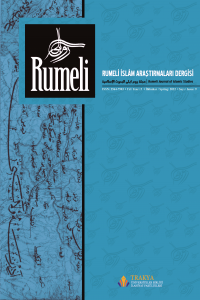Öz
Şahsî varoluşa dair tasavvurla, kâinata ve tarihe dair tasavvur, başka bir deyişle inanç ile bilgi, bilim ve tarih arasındaki yakın irtibat sebebiyle Kur’an-ı Kerim’in tarihî anlatımları ancak sahih İslâm itikadı zemininde sıhhatli okunabilir. Bilhassa Aydınlanma tecrübesi sonrası materyalist, pozitivist, tabiatçı, mekanist ve seküler kabullere dayanan Batı metafiziğinin yoğun tesiriyle, Kur’an-ı Kerim’i, Sünnet’i ve İslâm ilim ve kültür tarihini yeniden okumaya tâbi tutan bazı Müslüman aydınlar, bilhassa ilahî takdir ve yardımın sünnetine dair farklı bir takım anlayışlar ortaya koydular. Bu makalede modern dönemde zuhur eden bu farklı okumalar da göz önünde bulundurularak Ebû Mansûr el-Mâtürîdî (ö. 333/944), Ebü’l-Kāsım ez-Zemahşerî (ö. 538/1144) ve Fahrüddîn er-Râzî (ö. 606/1210) gibi biri Mâtürîdî, biri Mûtezilî, biri de Eş’ârî olan, her biri Kelâm ve Tefsir’de temâyüz etmiş üç büyük öncü âlimin tefsirlerinde Bedir Gazvesi’ndeki ilahi takdir ve yardımın sünnet ve hikmetini nasıl anladıkları ortaya konulmuştur. Farklı ekollere mensup üç âlimin de, İslâm itikadına dayalı tarih tasavvuru zeminde Bedir’de tabiatüstü mucizevi ilahi yardım konusunda ittifak ettikleri fakat bu yardımın şekli konusunda yer yer farklı görüşlere sahip oldukları görülmüştür. Sonuç bölümünde meseleye dair klasik anlayış ile modernist anlayışlar karşılaştırılmış ve değerlendirilmiştir.
Anahtar Kelimeler
Kaynakça
- Azimli, Mehmet. “Hz. Peygamber Dönemi Savaşlarında Meleklerin Yardımı Meselesi” İslâmi Araştırmalar Dergisi. 21/3 (2010) 172-183.
- Azimli, Mehmet. Siyeri Farklı Okumak. Ankara: Ankara Okulu Yayınları, 2010.
- Bıçak, Ayhan Tarih Metafiziği ya da Kendilik Bilinci. İstanbul: Dergâh Yayınları, 2019.
- Bilmen, Ömer Nasuhi. Kur’ân-ı Kerim’in Türkçe Meâl-i Âlisi ve Tefsiri. İstanbul: Genel Dağıtım: ts.
- Çelebi, İlyas. “Sünnetullah” Türkiye Diyanet Vakfı İslâm Ansiklopedisi. 38/159-160. İstanbul: TDV Yayınları, 2010.
- el-İsfahânî, Râgıb. el-Müfredât fî garîbi’l-Kur’ân. Beyrut: Dâru’l-Ma’rife, 2005.
- el-Mâtürîdî, Ebû Mansûr. Te’vilâtü ehli’s-Sünne. thk. Mecdî Bâsellûm. Beyrut: Daru’l-kitabi’l-ilmiyye, 2005.
- er-Râzi, Fahreddin. et-Tefsirü'l-kebir, Mefatihü’l-gayb. çev. Sadık Kılıç, vd. Ankara: Akçağ Yayınları,1990.
- es-Sâbûni, Nureddîn. el-Bidâye fi usûli’d-dîn. thk. Bekir Topaloğlu. İstanbul: M.Ü. İlahiyat Fakültesi Yayınları, 2015.
- et-Teftâzânî, Sa‘düddîn. Şerhu’l-Akāid, Beyrut: 2007.
- ez-Zemahşerî, Ebü'l-Kasım Carullah Mahmûd b. Ömer b. Muhammed. Keşşaf Tefsiri = El-Keşşaf an haka’iki gavamidı’t-tenzil ve uyuni’l-ekavil fi vucuhi’t-te’vil. çev. Muhammed Coşkun vd. editör Murat Sülün. İstanbul: Türkiye Yazma Eserler Kurumu Başkanlığı, 2016.
- Mustafa Sabri Efendi. Gaybın Önünde el-Kavlu’l-Fasl. çev. Muhammet Uysal. İstanbul: Ketebe Yayınları, 2019.
- Özervarlı, M. Sait. Kelâmda Yenilik Arayışları. İstanbul: Türkiye Diyanet Vakfı, 1998.
- Sülün, Murat. Kur’an-ı Kerim Açısından Allah’ın Yardımı Peygamber’in Zaferi. İstanbul: Siyer Yayınları, 2020.
- Yazır, Elmalılı M. Hamdi. Hak Dini Kur’an Dili. İstanbul: Eser Neşriyât, 1979.
THE BATTLE OF BADR IN THE NOBLE QUR'AN IN THE CONTEXT OF THE SUNNAH OF DIVINE PROVIDENCE AND INTERVENTION
Öz
The historical narratives of the Qur'an can only be understood properly based on true Islamic creed due to the strong relationship between the understanding of personal being and the understanding of the universe and history, in other words, between belief and knowledge, science and history. With the extensive influence of the Western metaphysics based on materialistic, positivistic, naturalistic, mechanistic, and secularist suppositions, particularly after the Enlightenment, several Muslim intellectuals who reinterpreted the Qur'an produced certain approaches regarding the course (sunnah) of divine providence and intervention in particular. In this article, the views of three pioneering Māturīdī, Muʾtazīlī, and Ash'ārī scholars, namely Abū Mansūr al-Māturīdī (b. 333/944), Abū al-Qāsım al-Zamahsharī (b. 538/1144) and Fakhr al-Dīn al-Rāzī (b. 606), each of whom excelled in theology (Kalām) and Quranic Exegesis (Tafsīr), regarding the course and the wisdom of the divine providence and intervention during the Battle of Badr in their exegesis were revealed in view of the various interpretations those emerged in the contemporary age. On the basis of the understanding of history based on Islamic creed, it was observed that these three scholars from various schools agreed on the subject of supernatural and miraculous aspects of divine intervention at Badr, but their perspectives varied as to the manner of this intervention. In the conclusion section, the classical and modernist approaches to the topic are compared and evaluated.
Anahtar Kelimeler
Kalām Battle of Badr Predestination Miracle Divine Law Divine Intervention
Kaynakça
- Azimli, Mehmet. “Hz. Peygamber Dönemi Savaşlarında Meleklerin Yardımı Meselesi” İslâmi Araştırmalar Dergisi. 21/3 (2010) 172-183.
- Azimli, Mehmet. Siyeri Farklı Okumak. Ankara: Ankara Okulu Yayınları, 2010.
- Bıçak, Ayhan Tarih Metafiziği ya da Kendilik Bilinci. İstanbul: Dergâh Yayınları, 2019.
- Bilmen, Ömer Nasuhi. Kur’ân-ı Kerim’in Türkçe Meâl-i Âlisi ve Tefsiri. İstanbul: Genel Dağıtım: ts.
- Çelebi, İlyas. “Sünnetullah” Türkiye Diyanet Vakfı İslâm Ansiklopedisi. 38/159-160. İstanbul: TDV Yayınları, 2010.
- el-İsfahânî, Râgıb. el-Müfredât fî garîbi’l-Kur’ân. Beyrut: Dâru’l-Ma’rife, 2005.
- el-Mâtürîdî, Ebû Mansûr. Te’vilâtü ehli’s-Sünne. thk. Mecdî Bâsellûm. Beyrut: Daru’l-kitabi’l-ilmiyye, 2005.
- er-Râzi, Fahreddin. et-Tefsirü'l-kebir, Mefatihü’l-gayb. çev. Sadık Kılıç, vd. Ankara: Akçağ Yayınları,1990.
- es-Sâbûni, Nureddîn. el-Bidâye fi usûli’d-dîn. thk. Bekir Topaloğlu. İstanbul: M.Ü. İlahiyat Fakültesi Yayınları, 2015.
- et-Teftâzânî, Sa‘düddîn. Şerhu’l-Akāid, Beyrut: 2007.
- ez-Zemahşerî, Ebü'l-Kasım Carullah Mahmûd b. Ömer b. Muhammed. Keşşaf Tefsiri = El-Keşşaf an haka’iki gavamidı’t-tenzil ve uyuni’l-ekavil fi vucuhi’t-te’vil. çev. Muhammed Coşkun vd. editör Murat Sülün. İstanbul: Türkiye Yazma Eserler Kurumu Başkanlığı, 2016.
- Mustafa Sabri Efendi. Gaybın Önünde el-Kavlu’l-Fasl. çev. Muhammet Uysal. İstanbul: Ketebe Yayınları, 2019.
- Özervarlı, M. Sait. Kelâmda Yenilik Arayışları. İstanbul: Türkiye Diyanet Vakfı, 1998.
- Sülün, Murat. Kur’an-ı Kerim Açısından Allah’ın Yardımı Peygamber’in Zaferi. İstanbul: Siyer Yayınları, 2020.
- Yazır, Elmalılı M. Hamdi. Hak Dini Kur’an Dili. İstanbul: Eser Neşriyât, 1979.
Ayrıntılar
| Birincil Dil | Türkçe |
|---|---|
| Konular | Din Araştırmaları |
| Bölüm | Araştırma Makaleleri |
| Yazarlar | |
| Yayımlanma Tarihi | 28 Nisan 2022 |
| Gönderilme Tarihi | 12 Mart 2022 |
| Yayımlandığı Sayı | Yıl 2022 Sayı: 9 |


